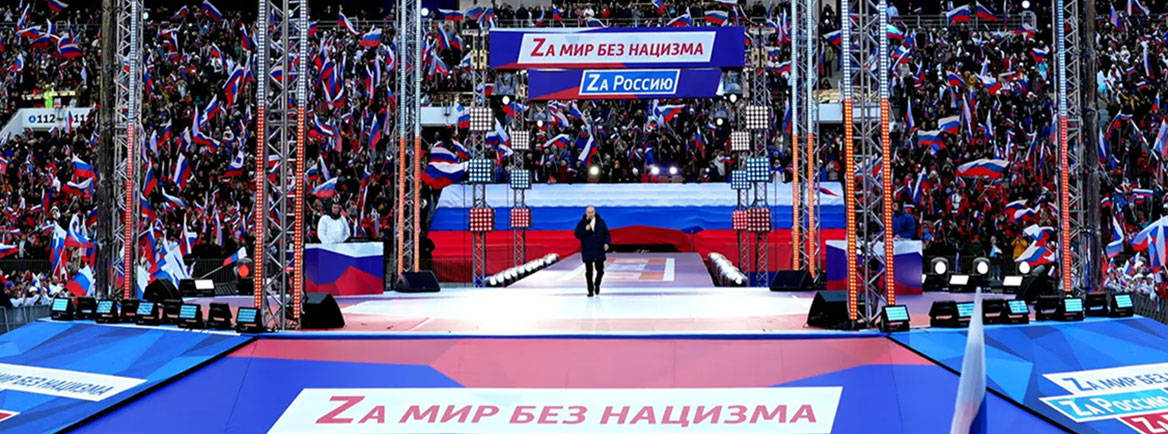Putin Doubles Down with Patriotic Slogans – and Repression
With Russian forces struggling to make progress in Ukraine, Putin is resorting to ever more extreme domestic measures to shore up his regime.
As Russian forces shelled peaceful Ukrainian cities, killing the civilian population of Ukraine, last Friday Russian President Vladimir Putin hosted a staged rally in Moscow’s Luzhniki Stadium. In a rare public speech, Putin praised Russian ‘unity’ over the war in Ukraine and repeated his well-prepared narrative that Russia’s goal in Ukraine is to stop genocide against ethnic Russians in the Donbas region.
The Soviet-style gathering, embellished by nostalgic songs about the old days, was perhaps the most overt demonstration of Putin’s insecurity with regards to keeping Russian citizens united as sanctions kick in and Russia becomes increasingly isolated from the global financial system. As Putin walked around the banner ‘a world without Nazism’, the gathered citizens waved Russian flags and chanted patriotic songs. Yet, many have admitted that they were forced by their employers to participate in the rally, while students were offered a day off to boost attendance.
War on Two Fronts
It has been a month since Russia initiated its war in Ukraine, and it is clear that the Russian troops are experiencing serious setbacks. Despite Putin’s claims that the so-called special military operation is going according to plan, Moscow has not been able to score a swift victory and has so far failed to take Kyiv or any major cities. Time is not in Putin’s favour either. Faced by robust Ukrainian resistance, Russian troops are struggling with low morale and heavy casualties.
In the meantime, the invasion of Ukraine has served as a wake-up call for the West, prompting allies to impose heavy sanctions on Russia. With some countries having appeased Russia for decades, Putin has heavily miscalculated by counting on the West’s inability to impose costs for Russian aggression. So far, the opposite has happened. The sanctions are no longer targeted: they are affecting every segment of society from oligarchs to ordinary Russian citizens, who can eventually become a force for change.
At a time when Russia is largely losing the war on the information battlefield, depriving Russians of objective information has become the ultimate priority
Despite Russian claims of having the ‘noble’ goal of liberating and denazifying Ukraine, the Kremlin has to fight on two different fronts: in Ukraine and at home. As Putin has been unable to compensate for the economic hardship in Russia with a swift and glorious victory in Ukraine, the only remaining tool to hold on to power is increasing repression. If Russian forces are unable to advance in Ukraine and thereby grant Putin a propaganda victory to feed citizens with, ordinary Russians may decide that the ship is going down and it is time to act.
Full Assault on the Media
Putin knows the dangers of an increasingly unhappy population. The fear of his own people has led Putin’s regime to reach for new extremes. At a time when Russia is largely losing the war on the information battlefield, depriving Russians of objective information has become the ultimate priority. Independent Russian media have long suffered intense pressure from the authorities. Last year, the Kremlin successfully weaponised the law on foreign agents to target media organisations and individual journalists, making it untenable for them to work in Russia.
This time, Moscow is waging a full assault on the media. The recent law on fake news has criminalised any public opposition to the Russian invasion of Ukraine. Unless the media follows the Kremlin’s narrative, journalists could serve 15 years in prison for spreading ‘false’ information, including calling the war an invasion as opposed to using the Kremlin-approved term ‘special military operation’.
Independent news outlets such as Radio Ekho Moskvy and Dozhd TV have had to stop operating in Russia, with journalists fearing for their lives and fleeing the country. Similarly, the government fears that Russians may receive objective information on the war in Ukraine through social media such as Facebook and Instagram, leading the Kremlin to ban both platforms under the ‘extremism’ law. Having witnessed how the jailed opposition leader Alexei Navalny has mobilised thousands of people to join protests in Russia, the Kremlin is increasingly cutting its citizens off from the civilised world.
Lack of Opposition Leadership
Despite the government organising an artificial rally, waving Russian flags and deploying a surge of patriotic symbolism, anti-war protests were recently held in 64 Russian cities. Since the beginning of the Russian invasion, authorities have detained around 15,000 people for opposing Russian aggression in Ukraine. A peaceful activist has recently been detained for holding a blank piece of paper, demonstrating the uncompromising approach of Putin’s regime. In today’s Russia, anyone who is not justifying the current offensive in Ukraine has become an enemy of the state.
By destroying the opposition and using violence against his own citizens, Putin is counting on fear as the only remaining tool of his authoritarian regime
So far, the only person in Russian politics who has managed to mobilise tens of thousands of people onto the streets – Alexei Navalny – has been sentenced to nine years in jail. While all eyes are on Ukraine, Putin’s regime has found a way to silence the most prominent opposition leader. At a time when Russia is facing the consequences of its dangerous military gambling, people like Navalny are a real threat to the longevity of Putin’s reign. Without an opposition figurehead, it is highly unlikely that Russian society will be able to mobilise in large numbers and demand change. By destroying the opposition and using violence against his own citizens, Putin is counting on fear as the only remaining tool of his authoritarian regime.
The Purges Begin
Despite the ongoing crackdown on media and civil society, Putin’s latest speech indicates that much tougher repression lies ahead. Last week, he called all Russians opposing the war ‘traitors’ and ‘fifth columns’ who need to be removed from society. In his Stalinesque speech, he fiercely criticised Russians who live ‘mentally’ in the West, and called for a self-purification of Russian society. This was primarily a warning to the Russian elite. His speech served as a preventive measure to silence any dissatisfied voices that may emerge in the future.
Intensification of repression at home in conjunction with the ongoing war in Ukraine is leading Russia into deep uncertainty, and perhaps the most dangerous phase of Putin’s rule. The fear of repression and a worsening quality of life due to sanctions has led many Russians to flee the country instead of protesting in the streets. The Gulf states have become a safe haven for the super-rich, while ordinary Russians are pouring into Georgia and Armenia. However, many Russians who have fled the country are more concerned about how sanctions will affect their lives, rather than the war crimes that Putin’s regime is committing in Ukraine.
Despite the severe price that Russia will eventually pay, no matter what the West does, the real change must come from within. So far, the invasion of Ukraine has not become a catalyst for millions of Russian citizens to unite and speak up. Yet, as sanctions hit harder, and given that the West remains consistent and united against the Kremlin, the risk of such upheaval increases – but only in the longer term.
The views expressed in this Commentary are the author’s, and do not represent those of RUSI or any other institution.
Have an idea for a Commentary you’d like to write for us? Send a short pitch to commentaries@rusi.org and we’ll get back to you if it fits into our research interests. Full guidelines for contributors can be found here.
WRITTEN BY
Natia Seskuria
Associate Fellow; Founder and Executive Director of RISS
- Jim McLeanMedia Relations Manager+44 (0)7917 373 069JimMc@rusi.org


